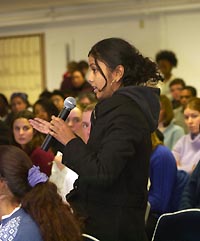|
This is an archived article.
For the latest news, go to the Advance
Homepage
For more archives, go to the Advance Archive/Search Page. |
||||
|
Affirmative Action Panel Discusses
Potential
Impact Of Impending Supreme Court Decisions By Allison Thompson For the first time in more than 20 years, the U.S. Supreme Court is scrutinizing the way in which institutions of higher learning consider race in the admissions process. The Court's decisions in two cases currently before it, both of which were filed against the University of Michigan, have the power to change how UConn and other universities make admissions decisions.
During a fireside chat about the cases, University representatives and students agreed that the Court's ruling could change not only the admissions process but also the make-up of college campuses. "This is indeed an attack on affirmative action," said Ron Taylor, vice provost for multicultural affairs. "My challenge to those who oppose it [affirmative action] is, what would you put in its place? What we need are race- conscious policies to deal with these issues of diversity." Until now, a Supreme Court decision handed down in 1978 has set the precedent for how race is considered in admissions in higher education. In that case, which was filed by Allan Bakke after he was rejected twice by the University of California-Davis's medical school, the Court ruled that universities can't run two parallel admissions processes but can use diversity as a plus factor in admissions. "Bakke has been the law of the land for admissions folks," said Dolan Evanovich, associate provost for enrollment management. The Supreme Court's impending decision can affect how the University makes admissions decisions on every level, Evanovich said. The University of Michigan cases are important ones that the UConn will have to respond to once the Supreme Court makes its decision, he added. Having a diverse student body is an institutional priority for the University, Evanovich noted. The University does not have a quota system or a point system. Instead, every application is read several times, with special attention given to factors such as a student's standardized test scores, essays, letters of recommendation, class rank, and grade point average. That process, he said, which has been analyzed and evaluated by legal experts, has resulted in UConn attracting good students. "We're on very firm ground, at least up to this point," added James Morales, director of admissions. According to Morales, the school needs to ensure that the pool of applicants is as diverse as possible. In order to do that, University representatives maintain frequent contact with and conduct recruitment activities at schools that have many students of color, as part of the institution's overall recruitment strategies. At this point, Morales noted, it's hard to say how the Supreme Court's decision will affect the University. If race-conscious admissions processes become illegal, the school could struggle to obtain its objectives. "I think it's going to be a challenge for all of us," he said. The importance of diversity can't be underestimated, noted Damon Williams, assistant vice provost for multicultural affairs. Students who attend diverse schools are more prepared to lead in the 21st Century, he said. Students who attended the event agreed that diversity is an important goal that should be considered in admissions. Kerry Kozaczuk, an undergraduate majoring in illustration, noted that it would be ideal if admissions could be colorblind, but added that she doesn't think that's realistic right now. "I think the whole concept of a 'colorblind' society is a joke," said Ricardo Salmon, a sixth-semester political science major. Every day, he noted, he is judged simply because he's a person of color. Wielding a poster that showed the number of points the University of Michigan awards applicants for various things, such as race and grade point average, Salmon pointed out that applicants can receive 20 points if they belong to certain ethnic groups. The same number of points can also be awarded for a variety of other reasons, at the discretion of the provost. An applicant needs at least 150 points to be admitted to the school. The affirmative action discussion, which took place on Feb. 11, was sponsored by the cultural centers. |


